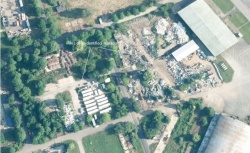
Search archive
Detecting Waste Crime Using Satellites – If you look, you will find.
31/01/2018

Air & Space Evidence, an academic spin-off company in the UK, set up by two former colleagues at University College London – Ray Purdy (an environment lawyer) and Ray Harris (an Earth observation expert), have launched a new global service which can detect illegal waste dumping and waste crime using cutting edge space technology.
They decided to target waste crime because it can be hard to detect quickly via conventional investigatory approaches. It is also the biggest environmental crime problem in Europe, and is estimated to cost EU countries €72 – 90 billion per annum. Criminals are short-changing economies by exploiting the high costs of legal waste management (landfill tax avoidance). The head of the Environment Agency in England recently called waste crime the “new narcotics,” commenting that “it feels to me like drugs felt in the 1980s: the system hadn’t quite woken up to the enormity of what was going on and was racing to catch up.” More than 1,000 illegal waste sites now spring up in some European countries each year. One single site discovered in Northern Ireland is believed to contain 1.5 million tonnes of illegally deposited waste – which is significantly more municipal waste than the whole of Northern Ireland produces in a year. Interpol, Europol and the United Nations have identified it as one of the fastest growing areas of organised crime. It is increasingly recognised to have the potential to rival drug trafficking in terms of scale and profits. One Italian mafia gang is estimated to make as much money annually from waste crime as the global turnover of McDonalds.
In 2016/2017 Air & Space Evidence received funding from the Open Data Incubator for Europe, European Space Agency, European Commission and Scottish Environmental Protection Agency to conduct research and trials examining how this problem can be tackled using space technologies. They are now launching a much-needed waste crime monitoring service to governments. time. Their analysts (some of who have a military intelligence background) can look back into the past using specialist data archives, but primarily they undertake pro-active intelligence gathering, identifying operational unlawful sites using tasked satellite data and analysis algorithms. Enabling successful early interventions (whilst problems are manageable) will catch criminals and enable governments to drastically reduce operational costs and environmental hazards and in some cases, recover a lot of tax money (some European countries are changing their legislation so that enhanced landfill taxes can apply to illegal sites, making it even more attractive to detect them).
In 2017 the waste detection model that Air & Space Evidence developed, won the prestigious European Space Product of the Year Award.
Air & Space Evidence do not know how much of a problem waste crime is in Australia, but if any States are experiencing problems with unlawful waste dumping then they are happy to engage. Under a current European Space Agency (ESA) project they are working on, if they can get governments interested in trials of their waste crime detection service, then ESA will pay between 50-75% of the trial costs. EPA’s could get to try a service for at least half price. If there is any interest in discussing potential involvement in this project, or Air & Space Evidence running a private webinar showing how the technology works and its benefits please contact Ray Purdy on info@space-evidence.net
PODCAST: SUPPORTING GOOD ENVIRONMENTAL MANAGEMENT IN THE QUARRY INDUSTRY. A SOCIAL SCIENTIFIC INVESTIGATION OF MOTIVATIONS AND BARRIERS
12/01/2018
In November 2017, Genene O'Neill. of the Department of Environment and Heritage Protection in Queensland, shared with us some findings from a recently completed project that examined compliance and non-compliance through the lens of social science. The project identified a range of motivations and barriers to compliance that provides new insights into how regulators can use these findings to increase compliance and beyond compliance behaviour.
THE SPEAKER
Genene O'Neill is a Principal Project Officer and Social Scientist leading the Behavioural Insights team in the Environmental Services and Regulation (ESR) division, at EHP.
Genene applies her understanding of human behaviour and behavioural change skills from her post graduate qualifications in psychology, and experience as a PhD candidate in the Psychology of Climate Change in the area of applied Environmental Psychology which is the interface of human decision making and behaviour and environmental impacts. Genene and her project team have delivered new insights into the motivations and barriers of a regulated community to better support quality environmental management and the development of operational interventions and strategies.

